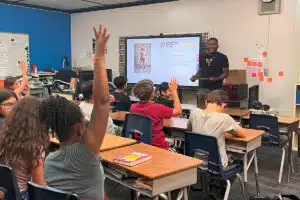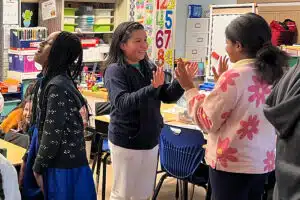
3 Effective Approaches to Enhance Events, Lessons and Meetings
At kid-grit, we are huge fans of CASEL (Collaborative for Academic, Social, and Emotional Learning).
What if we asked you, “What do you want for your kids?” Your reply might sound something like this: “I want them to be happy. Live a well-rounded life. Be financially secure. Find joy and balance in work and find a loving relationship.” We assume that in every state in this country, this would be a common answer.
So what’s going on with those states now rejecting social and emotional learning (SEL)? How is this happening? We must say, No way, José! This is a gross misunderstanding of the incredible impact of SEL programs that effectively support learning in the classroom.
We are missing the mark.
We need to do better for our kids. If our kids were feeling okay, mentally and emotionally, they would be thriving, preparing for their futures and feeling excited about their lives. Unfortunately, this is not the case for the majority of our youth in America right now. They can’t see their futures, most aren’t inspired, they don’t feel seen, and there is evidence of tremendous learning loss occurring.

At kid-grit, we understand that families, educators and communities want the best for their children. What we don’t understand is that right now, just as there is an ongoing mental health crisis for tweens and teens from all kinds of backgrounds, there’s political pushback in several states against the very learning programs that help young people feel mentally and emotionally safe in their learning communities.
This is like an arrow missing the bullseye. We know the target, we have the resources and skills, but if we point the arrow in the wrong direction, we will keep missing the mark.
Suicide and self-harm rates are higher than ever. Aside from the enormous loss and discord in our nation, the pandemic virtually forced youth to be on devices for learning AND for fun — for two years! The end result of this combination of factors has been disastrous for educators. The message we are hearing from our partners is that youth are so unregulated and disengaged since the pandemic that educators are feeling lost and depleted. It is one of the main contributing factors to the great teaching exodus.
Pay attention here.
Not only are educators underpaid and overloaded with work, but they are also dealing with a mental health crisis in their learning communities and school buildings. They spend endless hours trying to manage student behavior rather than teaching academic content that students need in order to move on to their next grade. Everyone is blaming one another.
Can you see how the arrow is missing the mark?
There are hundreds of intervention programs, leadership programs, SEL programs and professional teaching methods with evidence of results and data. The data shows that when these strategies/programs and interventions are implemented, teaching and learning become easier, because the students feel connected, calm and are able to focus on learning.
Now, this is hitting the mark!
As we slow down this summer, we invite you to take some time to reflect, consider how you are hitting the mark. How are you building connections with students? How are you fighting for the programs that will serve you and your students better?
Here are three tips that require very little risk but will offer you a huge return on your investment.
1. Just ask students how they are. This is a simple way to engage. Notice how they show up, don’t miss the opportunity. Sadly, most students think teachers don’t care. When you begin with this question at the start of the day, they will remember you for caring about them. This is motivating for a student!
2. Share small parts of your own life, challenges and wins, tell stories, let them in, be vulnerable, but keep your boundaries, use common sense here. They want to know more about you. You are interesting!
3. Stay connected to the parent/guardian. Don’t communicate only when there is an issue, and don’t stay silent. Ask about their expectations, stay in touch with them and send a note home sharing a compliment about their kids, it will go a long way. Be present with families. This will build a stronger community.


At kid-grit, we are huge fans of CASEL (Collaborative for Academic, Social, and Emotional Learning).


Here at kid-grit, we had a wonderfully crazy month in October! Check out this blog post to hear more about what we were up to.